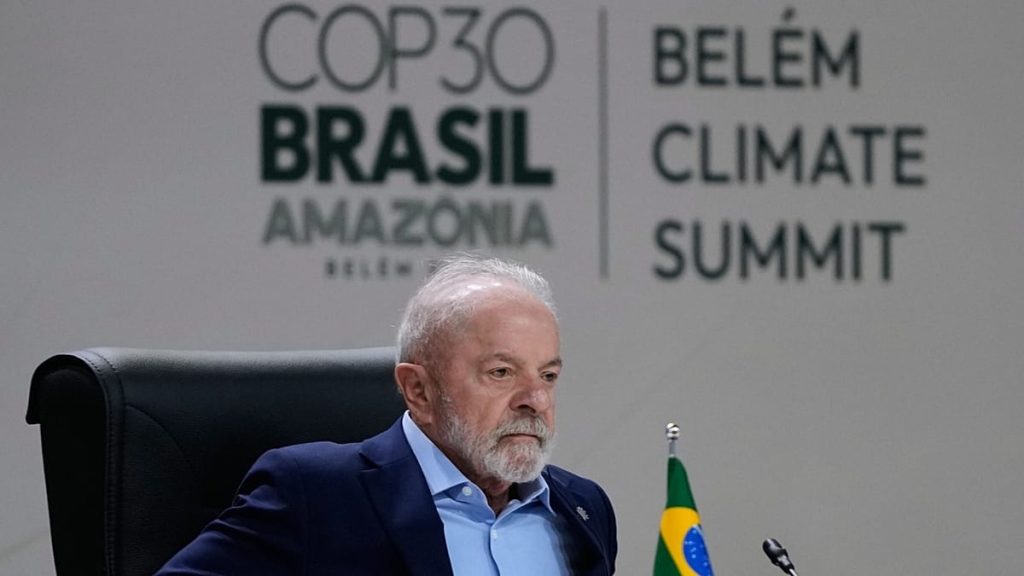Listen to the article
Climate Disinformation Surges Ahead of COP30, New Report Reveals
Climate disinformation campaigns have surged dramatically in the months leading up to the UN’s COP30 climate conference, according to a new report from the watchdog Climate Action Against Disinformation (CAAD). Despite global polls showing 87 percent of people support climate change policies, online misinformation continues to spread at an alarming rate, potentially undermining international climate action.
The report documents a staggering 267 percent increase in COP-related disinformation between July and September this year, with researchers identifying approximately 14,000 examples circulating online. This surge comes at a critical time as world leaders prepare for the upcoming climate summit in Belém, Brazil.
One particularly troubling example highlighted in the report features an AI-generated video of a fictional reporter standing in a flooded version of Belém with the caption “THE TRUTH ABOUT COP30 IN BELÉM IN 2025.” The entire content—the reporter, the flooding, and even the cityscape—was completely fabricated yet presented as legitimate news.
The Observatory for Information Integrity (OII) has identified Brazilian Telegram groups devoted to conspiracy theories as hotbeds for COP30-related misinformation. Researchers found over 285 mentions attacking the conference, the host city of Belém, and climate solutions generally.
“Spread rapidly and cheaply via online social media platforms and search engines, this disinformation is undermining policy and sabotaging action,” the CAAD report states.
The report distinguishes between misinformation—false information shared without malicious intent—and disinformation, which is deliberately created to deceive audiences. Climate disinformation appears particularly effective at seeding doubt even when public opinion broadly accepts climate science.
According to 2024 survey data, between 62 and 76 percent of Europeans report being worried about climate change. Yet targeted disinformation campaigns continue to foster skepticism about climate policies and solutions.
The CAAD report identifies major fossil fuel companies—collectively termed “Big Carbon”—as primary sources of climate disinformation. These include corporations involved in fossil fuel extraction, energy production, transportation, and large-scale agriculture.
“Big Carbon’s disinformation is designed to cause ordinary people to underestimate the strength of the scientific consensus on climate change,” the report explains. “It is also causing people to underestimate the strength of solidarity in demanding action.”
Tech companies also bear responsibility for allowing such content to propagate unchecked on their platforms. A previous CAAD investigation found that ahead of COP28, fossil fuel companies including Shell, ExxonMobil, BP, and TotalEnergies spent up to $5 million (€4.3 million) on climate disinformation advertisements on Facebook alone. These four companies accounted for 98 percent of such ads.
The threat posed by climate disinformation has become significant enough that COP30 will feature the first-ever Global Initiative for Information Integrity on Climate Change—a collaborative effort between the Brazilian government, United Nations, and UNESCO aimed at combating disinformation campaigns.
At the Leaders Summit on November 6, both Brazilian President Luiz Inacio Lula da Silva and French President Emmanuel Macron addressed the dangers of climate disinformation in their speeches.
“Extremist forces fabricate fake news to obtain electoral gains and imprison future generations in an outdated model that perpetuates social and economic inequalities and environmental degradation,” President Lula stated.
President Macron echoed these concerns, saying, “Climate disinformation today threatens our democracies, the Paris agenda, and therefore our collective security.” His comments come after a recent report revealed that French media has been amplifying narratives that discredit climate science and solutions.
UN Secretary-General António Guterres directly condemned corporations profiting from disinformation campaigns: “Too many corporations are making record profits from climate devastation—with billions spent on lobbying, deceiving the public and obstructing progress. Too many leaders remain captive to these entrenched interests.”
The proliferation of climate disinformation represents a significant obstacle to global climate action at a time when scientific consensus on the need for immediate measures has never been stronger. As COP30 approaches, the battle against deliberately misleading content will likely play a crucial role in determining whether meaningful climate agreements can be reached and implemented.
Fact Checker
Verify the accuracy of this article using The Disinformation Commission analysis and real-time sources.




8 Comments
It’s disheartening to see the scale of climate disinformation spreading online. With 87% of people supporting climate policies, we should be focused on positive solutions, not falling for misleading propaganda. Policymakers need to prioritize tackling this threat to climate progress.
Exactly. Disinformation can’t be allowed to derail crucial climate negotiations and action. We must remain vigilant and empower the public with reliable, fact-based information.
Disinformation is a major threat to climate progress. Spreading fake news and misleading propaganda undermines public trust and action. We need to crack down on these coordinated misinformation campaigns to protect the integrity of COP30 and other crucial climate negotiations.
Absolutely. Fact-checking and media literacy are so important to counter these manipulative tactics. It’s crucial that world leaders and the public have access to accurate, science-based information about climate change.
Despite strong public support for climate action, bad actors are working hard to sow doubt and confusion. This poses a real risk of undermining the progress we need to see at COP30. We must call out these disinformation campaigns and defend the integrity of the process.
It’s concerning to see such a dramatic surge in climate disinformation ahead of COP30. Fabricated videos and other AI-generated content pose a serious threat, blurring the line between truth and fiction. Robust fact-checking and digital safeguards will be crucial.
Agreed. The use of AI to create misinformation is a worrying development. We need to stay vigilant and invest in tools to detect and debunk these types of deceptive media.
The surge in COP-related disinformation is deeply concerning. Fabricated videos and other AI-generated content are blurring the line between truth and fiction, potentially undermining public trust and climate action. Robust fact-checking and digital safeguards are essential.